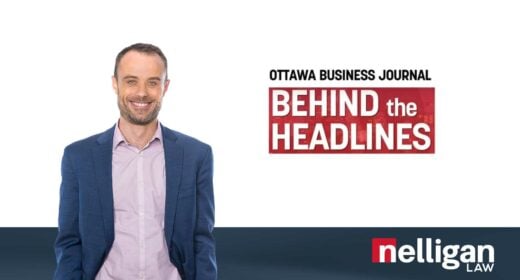Opening
Volunteers play an important role in society. A mixture of paid employees and volunteers staff many organisations. Volunteers provide many services that would otherwise not be available. Yet legally, volunteers remain in a vulnerable position here in Ontario. And, unlike some of the other provinces in Canada, Ontario has no specific legislation addressing the rights and obligations of volunteers or volunteer activities. Once an individual becomes a volunteer they are responsible for their actions and must be familiar with the laws and regulations governing their voluntary activities.
A. Legal Duties/Obligations of Volunteers
Like every individual they have legal duties and responsibilities, and if they fail to meet those duties they may be liable for the injuries or damages they have caused. A volunteer has a duty to take reasonable care when carrying out their duties. Failure to do so can sometimes amount to the tort of negligence. Failing to do something can also amount to negligence. Basically there are five elements of negligence:
- There must be a legal obligation to act in a certain way towards others.
- The conduct must be below the standard a reasonable person would have shown in the same or similar circumstances.
- Someone must have been injured or suffer loss because of the failure to act properly.
- There must be a causal connection between the negligent act and the injury or damage.
- The injury or damage must have been foreseeable.
Obligation to Act
Once an individual volunteers their services an obligation arises which requires the volunteer to carry out the act they have volunteered to do. For instance, where a volunteer is involved with the supervision of children, other volunteers or involved with people with disabilities, they must act in a certain way consistent with the duties they have volunteered for. Volunteers might also become liable for damages where an individual under their care or someone affected by their actions in injured, or property damaged.
Reasonable Person
The reasonable person standard measures the conduct of volunteers. Volunteers must behave to the same standard of care that would be shown by a reasonable person with similar ability and experience under the same circumstances. Where a volunteer falls short of this standard they may be held liable for negligence. If a volunteer has a nursing background then she or he would be expected to use his or her special skills if someone was injured. Similarly, an individual with an accounting or legal background would be expected to use their training and skills when dealing with the affairs of an organization of which they were on the Board of Directors.
Injury or Loss
Before anyone can sue a volunteer or an organization the individual must have been injured or have suffered a loss. This can include emotional harm as well as physical. Emotional harm requires a diagnosis of an actual mental illness or injury such as depression, mental anxiety or the worsening of such an illness. However, all injury or loss must have been a reasonably foreseeable consequence of the volunteer's action or lack of.
Causal Connection
For the volunteer or organization to be found liable in negligence, the injury or damage sustained must be causally connected to the negligent actions of the volunteer. A volunteer will not be liable if the damage or injury is the result of the injured person's own negligence.
Foreseeability
It is the volunteer's job to prevent foreseeable injury or damage. However, many activities carry risk and it is up to the volunteer to consider those risks prior to carrying out their activity. This involves an assessment of the amount of risk involved; a consideration of the ease at which the risk can be minimized or eliminated; and the importance or value of the activity. Not all risk can be eliminated but a volunteer has a duty to consider and weigh all foreseeable risks that could ensue.
Other Duties
Volunteers have a duty of confidentiality. This obligation to keep information confidential increases with the kind of service a volunteer provides. Volunteers who leak information can be found liable for any loss or injury suffered by the person whose information was leaked. However, in some cases a volunteer may have a duty to reveal information where another person is in serious danger or at risk of serious injury. Volunteers who provide services to children have an extra duty to report child abuse. Volunteers should inform their clients or participants if they feel they may have to reveal confidential information in the future. Volunteers also have a duty of confidentiality towards the organisation they are representing.
Other duties include the duty not to assault, and the duty not to discriminate. Where children are involved there is a duty to supervise, duty not to abandon, a duty to rescue and a duty not to use excessive force. When providing services for seniors or people with disabilities, there is the additional duty to accommodate people with disabilities.
Volunteers who give advice must take particular care. If they give out bad information they may be liable in negligence. However four conditions must be present and these are:
- The volunteer must be in the business of giving advice;
- The volunteer must claim to be, or have the appearance of being, skilled and able to give out advice;
- It must be foreseeable that the other person will rely on the volunteer's advice or statements;
- The client must rely on the information and suffer a loss or damage as a result.
Special duties arise where the volunteers are involved in outdoor activities, driving, preparing printed matters, or organizing special events and fundraisers. Volunteers undertaking such activities must ensure that they are adequately trained and knowledgeable in the particular area they are venturing into. Although an organization will likely be found liable, through vicarious liability, if something does goes wrong, this does not mean that the individual volunteer is sheltered from such liability. The individual volunteer is always responsible for his/her own conduct and such conduct falling below a reasonable standard and out with the scope of his/her volunteer duties may render that volunteer liable in law.
B. Duties of an organization towards their volunteers.
Voluntary organizations and the people that run them owe legal duties to their staff, participants, directors, and the volunteers. This duty also extends to anyone affected by the acts of the organization that suffers damage. Some of the duties of an organization are:
- Duty to take reasonable care (negligence).
- Duty to those injured by volunteers.
- Duty to volunteers.
- Duty to provide safe premises.
- Duty not to discriminate.
An organization must also ensure that its volunteers are legally permitted to volunteer. Visitors and newcomers may not be permitted to volunteer if they do not have work visas.
The Duty to take Reasonable Care
Like the individual volunteer, the organization has a duty not to injure anyone or damage property that the organization may foresee may be a result of its actions. This duty is the same as for the volunteers who were discussed earlier, however the organization's duty is much broader. This duty extends to making activities safe, and the extent and range of duties changes with the type of activities involved. This standard of care is the same as any other organization and therefore is not reduced if the organization engaged in the activity is unincorporated or a charitable organization.
Safety and prevention is the most prudent route for all organizations to take. This requires carrying out risk assessments to identify and eliminate possible risks, thereby reducing its liability.
Duty to those injured by volunteers
An organization may be held liable for the actions of their volunteers through Vicarious Liability. This means that when a volunteer is sued as a result of his actions, the organization may be held responsible at law because of the relationship between the volunteer and organization. However an organization will only be found liable if the following two conditions are met:
- The volunteer was under the direction and control of the organization; and
- The volunteer was acting within the scope of his or her responsibilities when the incident occurred.
To be considered under the direction and control of the organization, a volunteer must be directed as to what should be done, when, where, and how their responsibilities should be fulfilled. For instance a volunteer assistant who is under the supervision of a paid staff member will probably be seen to be under the control and direction of the organization.
When a volunteer is taking part in an activity or program approved by the organization they are considered to be acting within the scope of his/her responsibilities, even if he/she has not carried out their instructions correctly. Where a volunteer does something outside the scope of their volunteer activities the organization may not be held vicariously liable. However, an organization can still be held liable for such actions where a volunteer has been seen to have ostensible authority. This law was developed to protect businesses that contract with people who hold themselves out to be representatives of an organization, but later try to back out of responsibility.
Two conditions must be present for ostensible authority to be found:
- The volunteer reasonably appeared to have the authority to do the act (e.g. sign contracts).
- The other party did not know that the volunteer lacked the authority to do business on behalf of the organization.
Duty to Volunteers
The organization has a duty to protect its volunteers from unnecessary risk and danger. This stems from the master/servant concept of employment relationships, but is higher due to the fact that volunteers are unpaid help and the organization is benefiting from their services. This duty extends to hiring competent and qualified staff to oversee volunteer activities, as well as selecting competent and qualified volunteers to carry out the organizations activities.
The facilities provided must be adequate and there must be suitable and appropriate safety equipment available on the premises. Training in the use of safety equipment is also a reasonable standard expected of an organization. Training and screening for staff and volunteers to carry out the activities mandated is also expected so as not to put participants at risk.
Duty to Provide Safe Premises
There is an obligation on the organization to provide safe premises to anyone who enters in or on to property of the organization. This extends to space or premises rented by an organization whether indoors or outdoors, to facilitate its activities or events. This duty, which was mentioned earlier in relation to volunteers, is broader for organizations. A volunteer may be expected to clean up a water/food spill to prevent an accident, but the organization is responsible for providing fire extinguishers, repairing loose rails etc. Provincial legislation regarding occupier’s liability will be required to be followed, and such acts set out the legal duties owed to persons who come in contact with the organizations property.
This duty also falls under the general duty to take reasonable care. This duty compels organizations to act reasonably to prevent foreseeable harm. Where children or people with special needs and disabilities use an organization's premise, then this obligation is greater. An organization would be wise to develop a building safety checklist and insure inspections are carried out on a regular basis by staff and volunteers.
Duty not to Discriminate
Canadian Law protects all people from discrimination. The Ontario Human Rights Code specifically states that it is against the law to discriminate against someone in the area of employment law based on their race, colour, ancestry, place of origin, religion, marital status, family status, physical or mental disability, sex, sexual orientation, age or because of unrelated criminal convictions. In some cases this includes volunteers even though they are not classified as employees. However, some non-profit organizations may be exempt from some of the human rights provisions. For example organizations, which promote the interests of a particular group, may be exempt when it comes to granting a preference to someone from that group.
Generally however, it is better for organizations to act without discrimination and assume that protection from discrimination extends to any activity or service of the organization. This includes a duty not to discriminate when selecting volunteers and participants, protecting them both from discrimination once they have been selected and taking reasonable steps to prevent or stop discrimination when it occurs.
Organizations must also remember that they have a legal duty to reasonably accommodate individuals. This means that organizations may need to change policies and procedures that are discriminatory based on, for example, religious grounds. Activities that prevent disabled people from participating or attending must be adjusted to accommodate their needs. The onus is on the organization to make reasonable attempts to accommodate, by correcting or changing any policies, procedures or activities, which discriminate. An organization may need to show that it made reasonable efforts to accommodate a person up to the point of where they encountered financial hardship or some other serious issue prevented the accommodation from going further.
C. Liability of boards and directors
An elected Board of Directors assumes responsibility for the affairs of the organization and owes a duty of trust to participants, volunteers, other board members, staff, and members of the organization and to anyone who comes in contact or is affected by the acts of the board. There a numerous laws and statutes which a director must comply with and as such he has a duty familiarize himself with them. A director must use his/her skill and experience while managing the affairs of the organization. Additionally, he or she has a duty to put the interests of the organization before their own personal interests. Failure to do so can leave the organization liable for damages, or the director personally, in many situations.
Directors' liability is more of a threat to organizations now. Directors of incorporated organizations used to enjoy limited or no liability for damages when things went wrong. However, case law has progressed and directors can no longer hide securely behind the corporate shield. Directors have been held personally liable in a number of situations, which will be discussed below. There are even statutes which impose liability on directors and their officers in certain circumstances.
The changes in the law have forced organizations to rethink their risk management process. Generally, claims against non-profit organizations and their board members are rare. However, there is a growing fear of potential liability. The important point here is that it is the responsibility of directors and their officers to assess potential liability and put procedures and practices into place, which will reduce that risk. Adequate insurance is another useful and necessary means to have in place.
Personal Liability for the Organization's Financial Obligations
A director of a non-profit organization can be held personally responsible for the organizations financial obligations; i.e. debts. A director of an unincorporated organization is generally responsible for the organizations debts, whilst a director of an incorporated organization is protected from liability under the Canada Corporations Act and the Ontario Corporations Act. However that protection is not absolute, if the director fails to comply with the requirements of the statutes governing it.
A director can also be held personally liable if he/she has breached their duties, such as mismanaging the organizations funds, making improper loans, or making unlawful personal profits. The Employment Standards Act and Income Tax Act impose additional obligations, which may render a director personally liable when the obligations imposed are not met.
Duties of Boards and Directors
Volunteer directors of boards owe legal duties to their organizations, staff, volunteers, participants, and anyone who is affected by the acts of the board. These duties include:
-
Fiduciary duties, such as;
- Duty to perform with diligence, care and skill,
- Duty to act with prudence,
- Duty to avoid a conflict of interest.
- Duty to maintain the organization’s legal status;
- Duty to employees; and
- Duty to act within the scope of their authority.
Fiduciary Duties
A fiduciary must always act without putting his/her own interests before the interests of their organization. This includes a duty to act fairly and to use the skill and experience they bring with them to the job. A director as a fiduciary must exercise a high standard of care in protecting the interests of the organizations. Directors are expected to attend meetings and to make reasonable inquiries into the day-to-day operations of the organization. They must participate in decision-making and cannot rely on the opinions of others when decision-making unless they have made reasonable enquiries.
A director has a duty to review and understand the financial statements. He/she cannot rely on their own lack of skill to remain ignorant of the situation. They have a duty to ask questions, to make enquiries and insist on full explanations. A board member, who reasonably relied on the financial statements, believing them to be true and accurate, or relied on false statements of other directors, may not be found liable for other people's fraud or negligence. However, this would be based on the premise that they had no reason to suspect that the financial statements were false or misleading and they were conscientiously doing their job.
Directors have a duty to act prudently. This means they should act cautiously and carefully, anticipating the results of their actions. The duty to act prudently also means that a director should avoid taking unnecessary risks.
The duty to avoid conflict of interest requires directors to put the interests of the organization above their own, and to declare any possible conflicts. Where there is a declared conflict the director must step back and take no part in the decision-making regarding that conflict. A conflict of interest is not prohibited, but a director must be careful to maintain a distance in relation to any decisions or transactions that may result in personal gain. This duty encompasses a duty to disclose, which must be:
- Full and honest.
- Be made promptly to each director.
- Include the specific form of the interest.
- Include the benefit that would be received.
Failure to disclose can result in liability, or being required to "disgorge" any profits made by the director.
Duty to Maintain the Organization's Legal Status
The director of an organization has a duty to maintain the legal status of the organization. Once an organization is incorporated, the statute governing it will require the director to file yearly returns and various documents to maintain its status. There are specific requirements also for non-profit and charitable organizations. It is the director's duty to ensure that the requirements of the governing statute are met.
Charitable organizations have additional duties under the Income Tax Act. These duties are quite strict and a director must ensure that the organization operates within its stated purpose to ensure its charitable status is maintained. When an organization changes it operations or direction, the constitution must be amended, and it is prudent to consult Revenue Canada to ensure that its proposed activities will not take the organization out of its charitable status.
Duty to Employees
Many statutes and collective agreements set out the employer's responsibility towards its employees. Directors must be familiar with the legislation and collective agreements and cannot simply delegate the responsibility to someone else. Failure to meet statutory requirements can lead to a director being held personally liable for penalties and fines. Directors may also be held liable if employees are mistreated or if they interfere in internal inquires or are negligent in their actions towards employees.
Duty to act within scope of authority
A director can be held personally liable for acting outwith the scope of his authority, or when the organization is acting outwith its permitted activities. For instance, a director who arranges a loan for the organization without formal board approval or if the loan is made in the names of directors instead of the organization, then the director or directors could be held personally liable for the repayment. However, if the board of directors agrees to approve the loan and adopt it, then the organization would take over responsibility for the loan. Of course the directors involved should not participate or take part in the vote to ratify or a conflict of interest would arise.
Conclusion
A volunteer, at whatever level in the hierarchy, has a number of duties, obligations and responsibilities. The basic duties, such as to take reasonable care, the duty of confidentiality, not to discriminate and to accommodate, are applicable to all levels of volunteers. However, the higher the position in the organization, and level of responsibility, the greater will be the scope of his obligations or duties. Additionally, expectations and standards of care increase with responsibility and position. Once a volunteer takes on a responsibility or task, they are expected to use the skills and training they bring to the job. A volunteer would be wise to ensure that the organization it is supporting has adequate insurance, as well as an appropriate selection and training procedure. Volunteer directors have greater responsibility and although they can delegate responsibilities to the organizations officers they cannot hide behind their own ignorance of the affairs of the organization to avoid liability. Directors should ensure that they are familiar with all legislation governing their organizations. Additionally, they need to be aware of the various duties owing to their volunteers, staff, and organization, as well as those outside the organization and carry out risk management assessments. And finally, a director must ensure that the organization stays within its stated purpose and goals, to ensure the insurance coverage remains valid, and the status of the organization is maintained.



